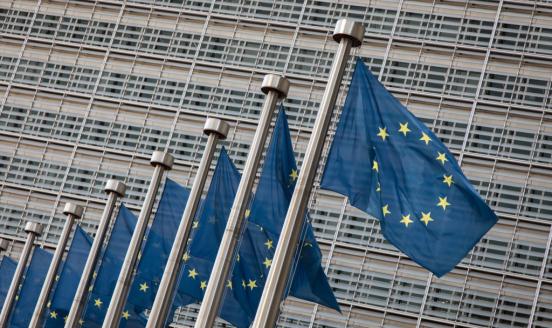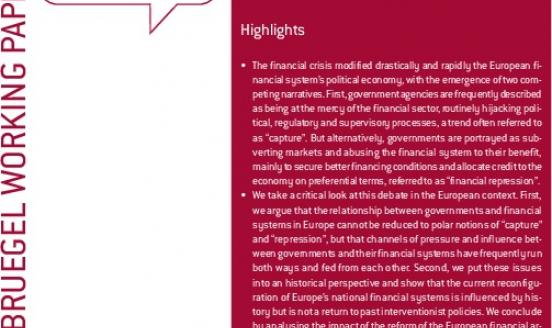The Greek demos vs. the Greek demons
There is something natural in the return of democracy to its European cradle. But Prime Minister Papandreou caught every one by surprise by announcing a referendum on the last programme that had just been negotiated a few days earlier in a marathon summit in Brussels. The eruption of politics in what was seen by the Europeans as a fairly technocratic process was bound to happen sooner or later. European democracies cannot be expected to make fundamental choices without the full legitimate backing of their own people. In this respect, the call of the Greek Prime Minister to seek legitimacy for its actions could be a blessing in disguise. In other countries, including in particular in Germany, leaders have sought broad political support of the financial assistance measures despite heavy criticism. However, the fact that it happens now is a major blow to the attempt to rebuild the credibility and the stability of the euro area. With this announcement, last week’s agreement is in limbo while it had achieved a substantial debt reduction for Greece.
But beyond the simple binary question asked to the Greek people, this referendum precipitates a new set of questions, not only for Greece but also for European governments, for the European Central Bank and for the IMF. For Greece, the result of a no vote is fairly straightforward and the history of default is a good guide of what would happen. In this instance, the Greek government will:
- Interrupt payments of coupons and principal to all bondholders, and renegotiate the terms of this debt deeply.
- Need to bring its primary deficit back to 0 immediately. The government would have to adjust its expenditures downward to match exactly the flow of revenue coming in from taxes and the like. This would imply a very significant cut in pensions and salaries, perhaps by an additional 20%. This will also force a more dedicated tax collection effort both domestically and abroad.
- The Greek banking system would be immediately bankrupt and we would observe a run on deposits. The Greek authorities will be unable to recapitalise their banks if the programmes are suspended and they may be forced to impose some form of capital controls to limit deposit attrition.
- Greece will then seek to rebalance its economy. The forced cut in wages together with the severe depression following the disorderly default will go some way in achieving the devaluation needed to get growth eventually going. Nevertheless, there may be a temptation to leave the euro area in order to achieve a nominal devaluation
For European governments, things will be more complex. There will inevitably be a bipolar split between the willingness to set an example, prevent moral hazard and therefore interrupt any form of financial assistance and the necessity to salvage the young monetary union and the integrity of the EU. This will be a difficult balance to strike but in practice it probably means that if Greece decides to end its adjustment programme, European governments will have to take very fundamental decisions about the future of the euro area and the European Union.
By setting an example, European governments would force a Paris Club negotiation on the financial assistance extended so far. More importantly, they will need to take a strong and credible view on the absolute integrity of the euro area and the steps necessary to enforce it or think of concrete ways to allow a smooth exit from the EU, which in fact, is legally possible under the Lisbon Treaty. Even more urgently, euro area governments will need to prepare very clear contingency plans to deal with a disorderly Greek default and possible exit. Ring-fencing the eurozone financial system is key. The stock market decline of yesterday confirms that banks/insurances will be most affected.
For the ECB, there will also be particularly daunting policy choices. For Greece, it will have to decide whether it changes its collateral framework to accept defaulted bonds in its open market operations or alternatively the extent to which it will let the Bank of Greece do it on its behalf via the Emergency Liquidity Assistance window. The ECB will also have to identify the key institutions necessary to salvage the payment system and be prepared to take full control of them. But more importantly, this event will force the ECB to update its stance on its securities market programme and the role it plays in stabilising government bond markets across the euro area.
The IMF is likely to remain a passive bystander in this process while it is an important stakeholder. It can give today some hope that this new programme is better than the previous ones by helping to shape a new Extended Fund Facility programme that gives more time to the Greek authorities to implement the necessary reforms and shows that there is some light at the end of the tunnel. But regardless of Greece, it will also have to decide whether it wants to play a role in Italy and Spain, possibly through precautionary arrangements to avoid other euro area countries to be impacted irredeemably by the unfolding Greek tragedy.
The opposite logic of continued and more favourable financial assistance despite a negative referendum would probably trigger calls for softer targets in other countries such as Portugal. It would embolden other countries to resist adjustments and more and extended fiscal solidarity would result. However, this policy wouldn’t be credible in and of itself. The distorted incentives would further delay real economic adjustment, which would increase divergences and lead to a two-tier eurozone with a periphery of low growth, weak employment and dependency on transfers. The only solution then would be to lay the grounds of a much stronger euro area enshrined in a form of fiscal federalism that would give rise to a mechanism for the issuance of jointly and severally guaranteed debt.
Ultimately, what PM Papandreou has called is much more than a Greek referendum. It is a moment of truth for the euro area and for the European Union as a whole.


